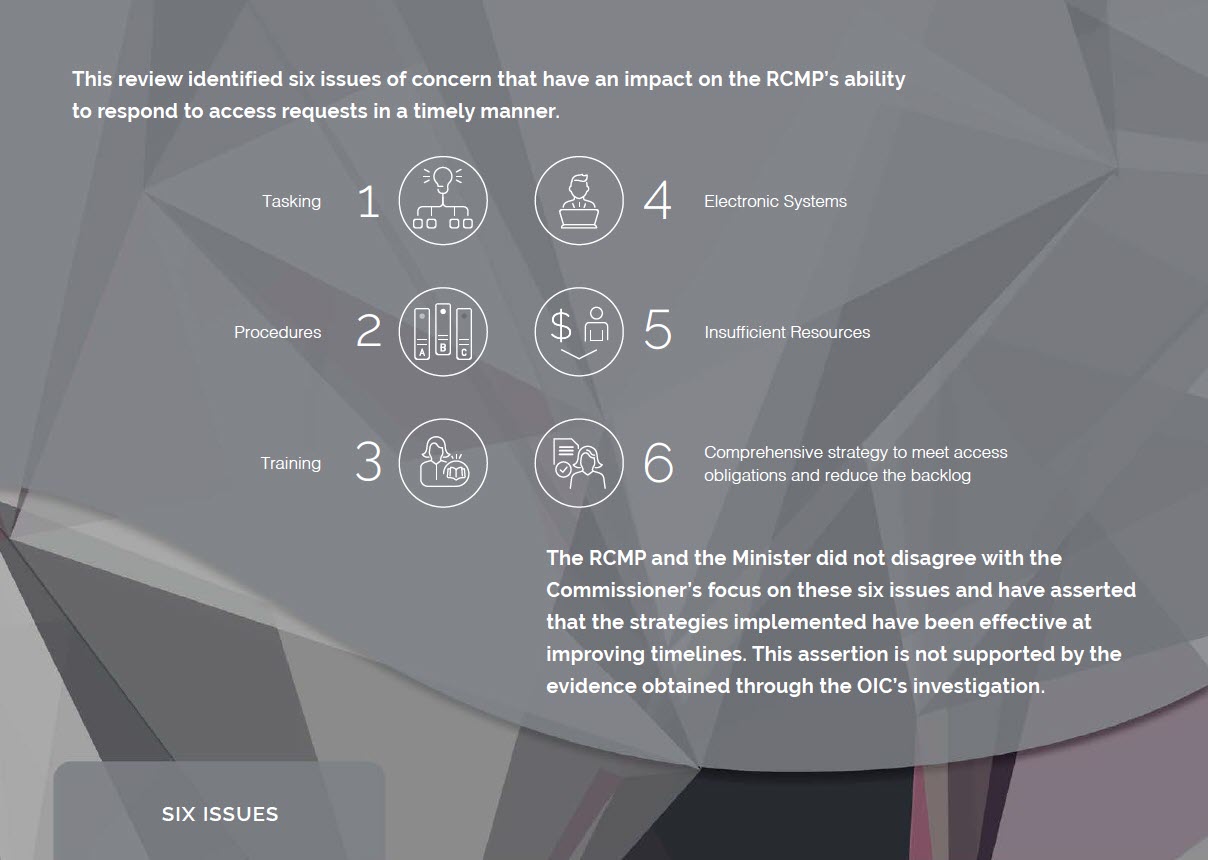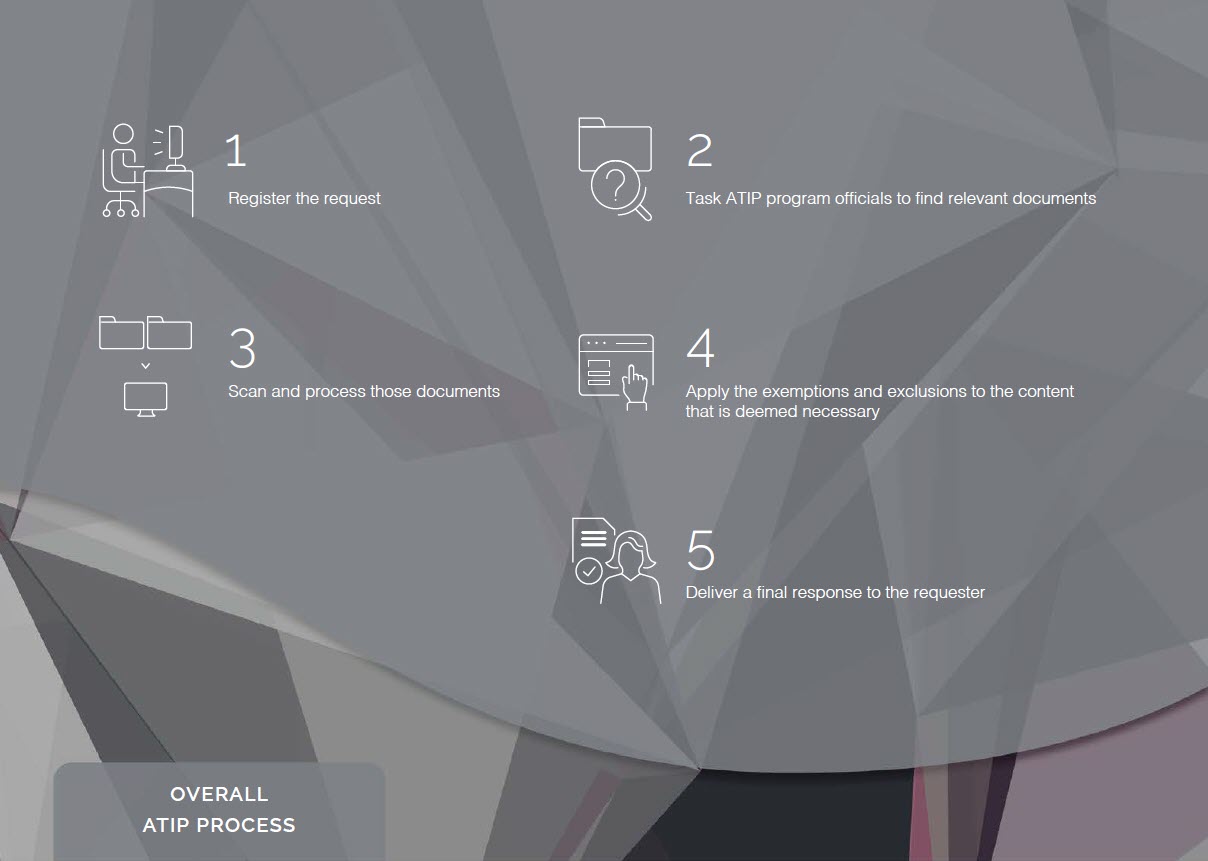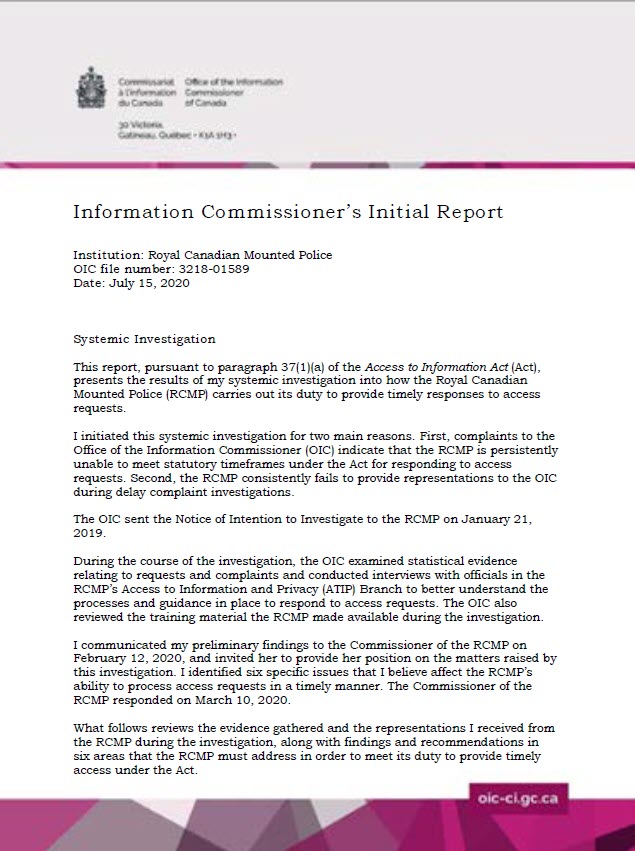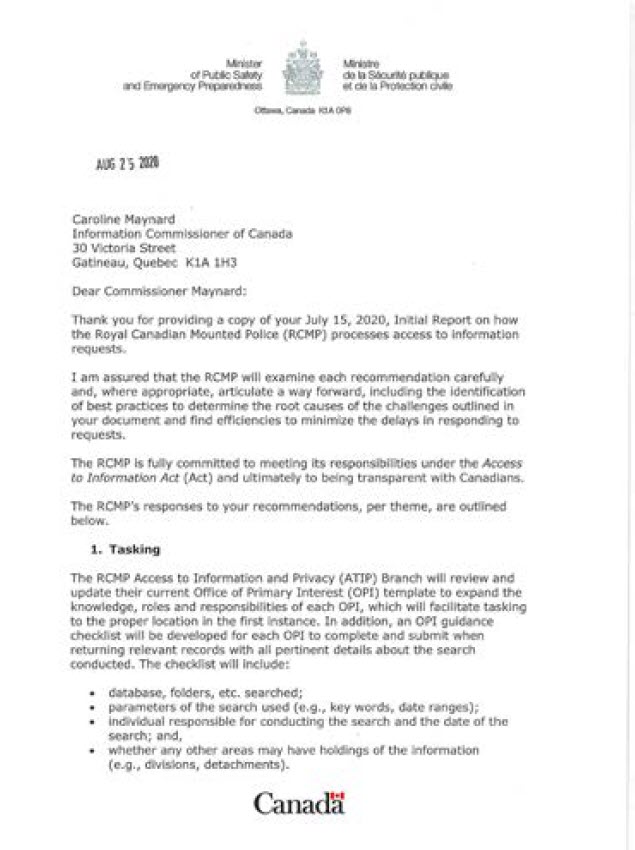Access at issue: The need for leadership
Systemic investigation of the RCMP
Special Report to Parliament from the Information Commissioner of Canada
November 17, 2020

“Change is needed now. Access officials must have the resources and tools they need to respond efficiently and effectively to access requests. The culture of secrecy must end. The right of access must be upheld.”
Caroline Maynard,
Information Commissioner of Canada
July 10, 2020
Introduction
I initiated an investigation into systemic issues in the Royal Canadian Mounted Police’s (RCMP) ability to provide timely access to information given my growing concern about:
- Complaints to the Office of the Information Commissioner (OIC) that indicated that the RCMP is persistently unable to meet statutory timeframes under the Access to Information Act for responding to access requests.
- The consistent failure of the RCMP to provide representations to the OIC during delay complaint investigations.
This report is tabled in Parliament several months into a global pandemic that has profoundly impacted the right of access – not just in Canada - but around the world. I would like to stress that the situation at the RCMP is critical and may soon be past the point of no return, unless senior leaders within the organization take action immediately. It is vital that the Minister of Public Safety and Emergency Preparedness, who has responsibility for the RCMP, ensure that the necessary resources, processes and tools are in place so that the RCMP can start meeting its obligations under the Act.
The RCMP asserts it has implemented many strategies to improve response times under the Act. However, my investigation revealed that the strategies implemented to date have failed to improve the RCMP’s performance. I believe that the RCMP will continue to fail in effectively managing access requests if leaders do not do more to improve the internal culture, along with the current processes and access to information program infrastructure.
I must also report that I was disappointed by RCMP’s lack of responsiveness during this investigation. I received no communication that would convince me that the RCMP is truly ready to address these problems.
The following presents a synopsis of the issues and recommendations made at the conclusion of the investigation. A copy of the findings and the 15 recommendations I made to the Minister of Public Safety, as well as his response, are included as appendices. The final report of this systemic investigation is found here.
Ultimately, this special report illustrates the disappointing facts associated with the review of the RCMP’s access to information program, facts which support my contention that there is an urgent requirement to address six problem areas. There is clear evidence that the RCMP’s inability to meet statutory timeframes under the Act is the norm, not the exception.
On more than one occasion in recent months, I have signaled that the Government of Canada must develop a new vision for the access system, which otherwise is in danger of collapse. Modernization must centre on innovation, new technology, and adequately resourced and equipped access units across government. There is no need to wait for legislative review to address deficiencies that are operational in nature. Leaders within government institutions must address the fact that they have not taken all appropriate measures to ensure that they properly uphold access rights, as required by the law as it currently stands. They are letting Canadians down.
The RCMP Commissioner and the Minister both appear to accept the status quo and are only prepared to commit to minimal improvements without a clear plan of action or timelines. In the current context, this is simply insufficient.
Canadians rightfully expect that the police force for Canada, in charge of enforcing Canadian law, will itself comply with it. The gravity of the situation at the RCMP calls for bold and comprehensive action to turn the tide.
I want Canadians to know that I will continue in my efforts to pursue meaningful change across the federal access system through various means. These include investigations of other government institutions with a view to encouraging compliance and operational improvements, and using the order-making powers granted to me in the June 2019 amendments to the Act.

Caroline Maynard
Information Commissioner of Canada
“I often say that leadership is key to ensuring the access to information regime is open and transparent. Strong leaders within the public service are essential to implementing the measures required to live up to these principles.”
-Statement by the Information Commissioner on
International Right to Know Day
![]()
ACCESS REQUESTS completed in under 30 days:
2016-2017
2,249
2018-2019
1,101
Percentage decrease:
↓-51%
The RCMP Systemic Investigation
The RCMP is a large and complex organization of more than 20,000 police officers and nearly 10,000 civilian employees in over 700 detachments in 150 communities across Canada. It also provides policing services in more than 600 Indigenous communities. Interest in its activities is significant and historically it has received a high volume of access to information requests.
The OIC reviewed statistical evidence about requests and complaints, and interviewed members of the RCMP Access to Information and Privacy (ATIP) Branch in order to understand how the flow of access requests is normally managed. Training materials available to staff were also assessed.
The OIC sent its letter of notice to the RCMP about initiating an investigation into its access to information operations on January 21, 2019. In February 2019, the RCMP confirmed that it had 4,532 active access to information requests of which 4,179 (92 percent) were beyond the statutory due date to respond.
Table 1 from the RCMP’s own report to Parliament about its access to information activities shows that, despite its efforts, it takes the RCMP significantly more time to respond to access requests now when compared to the performance reported three years ago. The report indicates that the RCMP completed 55 percent fewer access requests in less than 30 days in 2018–2019 when compared to its performance two years before.
Table 1: Completion time for access requests, 2016–2017 to 2018–2019 – Annual Report to Parliament 2018-2019 on the Access to Information Act and the Privacy Act
|
2016–2017 |
2017–2018 |
2018–2019 |
Percentage increase/decrease |
|
|---|---|---|---|---|
|
1 to 15 days |
1,017 |
397 |
545 |
-46% |
|
16 to 30 days |
1,232 |
493 |
556 |
-55% |
|
31 to 60 days |
775 |
516 |
633 |
-18% |
|
61 to 120 days |
481 |
650 |
522 |
9% |
|
121 to 180 days |
142 |
341 |
273 |
92% |
|
181 to 365 days |
148 |
389 |
942 |
536% |
|
More than 365 days |
63 |
181 |
705 |
1,019% |
“This is clear evidence that the RCMP’s inability to meet statutory timeframes under the Act is the norm, not an exception.”
– Information Commissioner to Minister of Public Safety
![]()
ACCESS REQUESTS
carried over to the next year:
2015-2016
224
2018-2019
3,688
Table 2 shows the number of requests the RCMP carried over from one fiscal year to the next grew from 224 at the end of 2015–2016, to 3,688 outstanding requests by the end of 2018-2019. This increase is despite an overall drop in the number of requests received. Between 2016-2017 and 2018-2019, the number of requests that remained unanswered in 365 days rose by over 1000 percent.
Table 2: Access to information caseload, 2016–2017 to 2018–2019 – Annual Report to Parliament 2018-2019 on the Access to Information Act and the Privacy Act
|
2016–2017 |
2017–2018 |
2018–2019 |
|
|---|---|---|---|
|
Outstanding requests from previous year |
224 |
1,192 |
3,428 |
|
Requests received |
4,826 |
5,203 |
4,436 |
|
Requests closed |
3,858 |
2,967 |
4,176 |
|
Deemed refusals |
1,336 |
2,047 |
2,979 |
|
Requests carried over to next year |
1,192 |
3,428 |
3,688 |
Information Commissioner's recommendations

Text version
Six Issues
This review identified six issues of concern that have an impact on the RCMP’s ability to respond to access requests in a timely manner.
- Tasking
- Procedures
- Training
- Electronic Systems
- Insufficient Resources
- Comprehensive strategy to meet access obligations and reduce the backlog
The RCMP and the Minister did not disagree with the Commissioner’s focus on these six issues, and have asserted that the strategies implemented have been effective at improving timelines. This assertion is not supported by the evidence obtained through my investigation.

1. Tasking – The trigger for Offices of Primary Interest to search for and produce records related to an access request
The first step for all government institutions responding to an access to information request is to “task” or assign certain officials within the organization with finding the relevant documents that will constitute the official response. This tasking procedure is a critical step that begins with the in-house ATIP Office. It requires knowledge of the organization and an ability to identify the Office of Primary Interest (OPI) - and there may be more than one - most likely to hold those documents.
At the RCMP, poor task assignment has led to many requests being bounced around from one OPI to another, sometimes producing a NIL response (i.e. “we have no records”). When a requester suspects that additional records exist, they may complain to the OIC. In one instance, a requester sought records related to a high-profile shooting in Nova Scotia for which the RCMP had been given jurisdiction to investigate. The RCMP responded that it had no relevant records even though it was obvious that such a response made no sense. The requester complained and ultimately, thousands of responsive records were identified, but only after the OIC started investigating.
This investigation found that the RCMP’s tasking processes are generally ineffective and inadequate and, in turn, do not ensure accurate responses to requests.
Commissioner’s Recommendations
- Review tasking processes to identify what impedes the processing of records and delays in responding to requests
- Implement measures to reduce or eliminate these problems (e.g., facilitate the ATIP Intake Unit’s ability to identify the relevant and correct OPIs when tasking):
- Require OPIs returning NIL responses to provide details about the search they conducted
- Require OPIs to develop and provide an evergreen reference document to the ATIP Intake Unit, in a consistent format, that explains their programs, mandate and information holdings, and the electronic and/or paper information management systems they use
- Identify best practices for tasking and share them with the ATIP Intake Unit regularly
Response from the Minister of Public Safety and Emergency Preparedness
The RCMP’s ATIP Branch will review and update their current OPI template to expand the reference to knowledge, roles and OPI responsibilities, which will facilitate tasking to the proper location in the first instance.
There are plans to prepare a checklist for OPIs, as well. However, the RCMP did not commit to ensuring that search parameters be documented when an OPI replies with a NIL response.
Despite the OIC’s findings, the Minister did not commit the RCMP to ensuring that search parameters be documented when an OPI replies with a NIL response. Nor did he commit the RCMP to implementing a process that will ensure its tasking processes remain evergreen.
The Minister’s response on tasking is not satisfactory, as it does not address two out of three recommendations. Improvements generated by the revision of templates and implementation of a checklist are unlikely to be sustained over time, given there is no commitment to ongoing process review.
“…an institution must, within the 30-day period or an extended period, register the request, task program officials with searching and retrieving responsive records, scan and process the records, apply appropriate exemptions or exclusions, and issue a final response to the requester.” – Information Commissioner to RCMP Commissioner

2. Procedures – Documented, consistent and auditable procedures are more likely to produce reliable results in a timely manner
When institutions receive access requests, they must process all responsive records under their control, regardless of format, and apply necessary and limited severances to that information, as permitted by the Act. Documented, consistent and auditable procedures are more likely to produce reliable, timely results.
Government institutions that manage access requests in a timely and efficient manner have clear protocols that delineate each step in their internal process. And they regularly check back to see that those processes are working.
The OIC investigation found that the RCMP does have Standard Operating Procedures (SOPs) related to processing and responding to access requests, which can be found in training materials, checklists and email communications. Unfortunately, we found no evidence that these SOPs are consistently applied across the organization or audited for effectiveness. As a result, staff lack knowledge of standardized procedures (and related skills) that would contribute to the effective management of requests.
Commissioner’s Recommendations
- Review and keep SOPs introduced in 2017 evergreen and relevant
- Regularly share updated procedures with those across the RCMP involved in responding to access requests
- Implement a process for access staff to monitor the implementation of SOPs across the RCMP
Response from the Minister of Public Safety and Emergency Preparedness
The RCMP committed to implementing a cyclical review process for their SOPs to ensure they remain up to date.
The Minister did not commit the RCMP to implementing an audit capacity to ensure that SOPs are implemented consistently across the organization and over time.

3. Training – Employees who receive adequate training are better able to perform in their role. Training lays the foundation for setting expectations in an organization.
Treasury Board of Canada Secretariat policies require institutions to ensure employees are properly informed of their responsibilities under the Act and receive adequate training.
Training lays the foundation for setting expectations in an organization and builds knowledge, skills and abilities to meet the standard set. Proper training ensures that employees are aware of their obligations under the Act and the standards the organization has set for its own access to information program.
The OIC’s systemic review looked closely at the RCMP’s approach to training for those with some responsibility for responding to access requests. While the investigation found the RCMP offered in-classroom and hands-on training to Intake Unit officers and ATIP analysts, this training was not mandatory, nor was there any evidence of plans to make it compulsory.
Commissioner’s Recommendations
- Continue to develop the training program for ATIP Branch staff and make attendance mandatory
- Hold more information sessions for RCMP employees across Canada and make attendance mandatory
- Develop training for individuals across the RCMP with primary and/or secondary ATIP responsibilities and make attendance mandatory
- Address the specific training needs of OPIs, taking into account the complexity of the organization and the regional dispersion of employees
Response from the Minister of Public Safety and Emergency Preparedness
The RCMP committed to providing yearly, mandatory information sessions for Liaison Officers, developing online training modules for employees with primary and secondary ATIP responsibilities, and continuing to liaise with OPIs. However, the RCMP has not committed to offering mandatory training to these employees.
The Minister’s response is disappointing because it only partially addresses the recommendations on training. The Minister has only committed to mandatory information sessions rather than making a full commitment to mandatory training. Yet, based on the findings of the investigation, only a mandatory training program for ATIP staff and employees across the RCMP with primary or secondary ATIP responsibilities is likely to produce significant improvement. Training is what is required to effectively inculcate the knowledge and skills needed to efficiently manage requests.

Text version
Overall ATIP process
- Register the request
- Task ATIP program officials to find relevant documents
- Scan and process those documents
- Apply the exemptions and exclusions to the content that is deemed necessary
- Deliver a final response to the requester

4. Electronic Systems – Canadians expect efficient, streamlined and digital services
The RCMP is badly served by the archaic information management systems that support its ATIP operations. Intake officers need an inordinate amount of time to manually upload and import records from operational systems into redaction software. And there is a limit to how much data can be uploaded at one time. More worrisome is the fact that these systems regularly crash, the maintenance contract for the redaction software expired years ago, the database is not being regularly serviced, and the RCMP still has not identified a new system administrator. Finally, the current software is not capable of gathering data and producing regular reports or analysis via an in-house dashboard.
The investigation also revealed that while the RCMP has an online portal for receiving access requests it is not integrated with its case management software. As a result, Intake officers must enter all data related to requests into the system manually, increasing the risk of data entry errors and data integrity, and taking time.
The situation could hardly be worse. The RCMP’s electronic systems are inadequate to support timely access to information, but there is little evidence of a comprehensive plan to address this situation.
Commissioner’s Recommendations
- Upgrade and integrate the digital tools and systems used to process access requests, keeping in mind the need to address the geographic dispersion of RCMP units and employees
- Adopt innovative and efficient digital practices to better serve requesters
- Invest in digital skills development for staff
Response from the Minister of Public Safety and Emergency Preparedness
The RCMP agrees that its current electronic systems are inadequate and cause challenges. It has committed to upgrading digital tools and exploring the possibility of reducing paper-based records. The RCMP confirmed that it has not yet joined the Treasury Board Secretariat Online Request Service.
The Minister of Public Safety has not committed the RCMP to implementing or adopting more innovative digital approaches or investing in digital skills development for staff. The RCMP will continue to fail at making progress without bolstering its electronic systems and giving its staff access to modern technology.
“The ability to access government information allows citizens to shine a light on government decision-making.”
– Statement by the
Information Commissioner on
International Right to Know Day

5. Insufficient resources – Human and financial resources must match the volume of incoming requests and longstanding backlog of open requests
Interviews conducted by the OIC revealed thatthe RCMP has insufficient human and financial resources to meet its access request workload, which includes both the high volume of incoming requests and a longstanding backlog of open requests.
Commissioner’s Recommendations
- Secure adequate human and financial resources for the RCMP’s ATIP program/function to allow it to meet its obligations under the Act
Response from the Minister of Public Safety and Emergency Preparedness
Improving compliance with obligations under the Act is a high priority for the RCMP and will inform funding allocation decisions.
Despite the fact that the Government of Canada has recently provided additional funding to the RCMP, it appears that there is still no targeted plan to channel some of those new resources to its ATIP program.

6. Comprehensive strategy to meet access obligations and reduce the backlog
More often than not, over the last three years, when the OIC receives a complaint against the RCMP it usually relates to a delay, meaning that the RCMP has not responded within the statutory timeframe.
The strategy the RCMP has put in place to improve response times involves the hiring of consultants. Unfortunately, the RCMP’s own access to information annual statistics (see Table 1) proves that this strategy has been ineffective.
Commissioner’s Recommendations
- Implement a detailed strategy that covers each of the six areas of concern highlighted in this report
- Adopt any other measures the RCMP determines would effectively help the RCMP meet its legislated obligations and reduce its backlog of open requests
Response from the Minister of Public Safety and Emergency Preparedness
The RCMP committed to hiring up to twelve consultants.
The RCMP still lacks a comprehensive strategy to address the persistent problems identified by the OIC. Consultants are not a cure-all for the backlog that the RCMP is facing. Without a better plan, the RCMP’s efforts to meet its statutory requirements will continue to fall short.
The RCMP’s failure to provide representations during delay complaint investigations.
The OIC’s investigation mainly focussed on the RCMP’s inability to respond to requests within statutory timelines. However, the lack of representations from the RCMP is also an issue. Clearly, the RCMP, like every institution, must deploy limited ATIP resources judiciously, in order to respond to access requests, while simultaneously dealing with the OIC when requesters choose to avail themselves of their recourse mechanism by way of complaint.
That said, as required by the Act, the Commissioner has made it clear that she will continue to seek representations from government institutions under investigation. When they fail to respond, she will not hesitate to conclude any investigation and issue recommendations and orders, when she finds the complaint is well-founded.
“Canadians deserve bold and decisive actions.”
-Statement by the
Information Commissioner on
International Right to Know Day
Conclusion
By nearly every measure, the RCMP is failing in terms of its obligation to ensure that Canadians have access to information about its operations and decision-making. While some of the information under its control is sensitive and may justifiably be withheld when personal details are involved or if the matter is before the courts, my investigation found many examples of mismanagement and lack of attention at various step of its handling of access requests. It would appear that the RCMP gives little or no priority to its access to information requirements.
The RCMP’s processes and procedures must be tightened and audited, to produce more reliable results. The entire digital infrastructure that underpins the RCMP’s access operations is essentially an impediment to those who handle access requests. Funding, training and staffing are significant issues. The size of the request backlog is shocking.
Most worrisome is the lack of action on the part of RCMP leadership. There is no evidence that the solutions put forward to date to address chronic delays and poorly managed processes really made any difference at all. None of the commitments made by the Minister have timelines associated with them. Without a comprehensive plan of redress and clear, targeted completion dates, following through on any of these individual action items could be indefinitely delayed by the various pressures facing an already overwhelmed ATIP team.
The response I received from the Minister falls short on many fronts, particularly when it comes to commitments to improve transparency and timely responses. He has ignored most recommendations and appears unconcerned by the failings identified within the RCMP’s ATIP operations.
This report offers suggestions about how the RCMP can begin to address the long-standing issues that have hindered its ability to manage its access obligations. But it will take leadership and commitment to improve on a track record that is sadly not up to the standard that Canadians expect.
Annexes
Annex 1.1

Initial Report of the Information Commissioner regarding the Royal Canadian Mounted Police dated July 15, 2020, that conveys the results of the systemic investigation of the department’s ATI processes.
Information commissioner’s initial report
Institution : Royal Canadian Mounted Police
OIC file number: 3218-01589
Date: July 15, 2020
Systemic Investigation
This report, pursuant to paragraph 37(1)(a) of the Access to Information Act (Act), presents the results of my systemic investigation into how the Royal Canadian Mounted Police (RCMP) carries out its duty to provide timely responses to access requests.
I initiated this systemic investigation for two main reasons. First, complaints to the Office of the Information Commissioner (OIC) indicate that the RCMP is persistently unable to meet statutory timeframes under the Act for responding to acce ss requests. Second, the RCMP consistently fails to provide representations to the OIC during delay complaint investigations.
The OIC sent the Notice of Intention to Investigate to the RCMP on January 21, 2019.
During the course of the investigation, the OIC examined statistical evidence relating to requests and complaints and conducted interviews with officials in the RCMP’s Access to Information and Privacy (ATIP) Branch to better understand the processes and guidance in place to respond to access requests. The OIC also reviewed the training material the RCMP made available during the investigation.
I communicated my preliminary findings to the Commissioner of the RCMP on February 12, 2020, and invited her to provide her position on the matters raised by this investigation. I identified six specific issues that I believe affect the RCMP’s ability to process access requests in a timely manner. The Commissioner of the RCMP responded on March 10, 2020.
What follows reviews the evidence gathered and the representations I received from the RCMP during the investigation, along with findings and recommendations in six areas that the RCMP must address in order to meet its duty to provide timely access under the Act.
Investigation
Data on the RCMP’s processing of access requests between 2016–17 and 2018–19 sheds light on the increasing problems the RCMP is having in responding to access requests in a timely manner.
The RCMP’s report to Parliament on its access to information activities in 2018–19 shows that between 2016–17 and 2018–19, the RCMP took significantly longer to respond to access requests. As Table 1 shows, the RCMP completed considerably fewer access requests in less than 30 days and more than 1000% more in more than 365 days.
Table 1: Completion time for access requests, 2016–17 to 2018–19
|
2016–17 |
2017–18 |
2018–19 |
Percentage |
|
|---|---|---|---|---|
|
1 to 15 days |
1,017 |
397 |
545 |
-46% |
|
16 to 30 days |
1,232 |
493 |
556 |
-55% |
|
31 to 60 days |
775 |
516 |
633 |
-18% |
|
61 to 120 days |
481 |
650 |
522 |
9% |
|
121 to 180 days |
142 |
341 |
273 |
92% |
|
181 to 365 days |
148 |
389 |
942 |
536% |
|
More than 365 days |
63 |
181 |
705 |
1,019% |
Second, and also according to the RCMP’s 2018–19 report, the number of requests the RCMP carried over from one fiscal year to the next grew from 224 at the end of 2015–16 to 3,688 requests at the end of 2018–19—this is despite an overall drop in the number of requests received (see Table 2).
Table 2: Access to information caseload, 2016–17 to 2018–19
|
2016–17 |
2017–18 |
2018–19 |
|
|---|---|---|---|
|
Outstanding requests from previous year |
224 |
1,192 |
3,428 |
|
Requests received |
4,826 |
5,203 |
4,436 |
|
Requests closed |
3,858 |
2,967 |
4,176 |
|
Deemed refusals |
1,336 |
2,047 |
2,979 |
|
Requests carried over to next year |
1,192 |
3,428 |
3,688 |
Third, in 2017–18 the RCMP responded to 31 percent of access requests within the statutory timeframes. By the next year, that figure had dropped to 29 percent. The Act sets out 30 days as the response time, unless an institution validly extends the time to process and respond to the request.
This is clear evidence that the RCMP’s inability to meet statutory timeframes under the Act is the norm, not an exception.
The RCMP agrees that it is challenged to respond to access requests within statutory time frames, noting that these challenges relate to and are compounded by the geographical dispersion of 30,000 employees, the large volume of requests and the diverse policing activities it undertakes. The RCMP also states that much of its policing related information is paper-based and spread across various systems rather than in one repository, making it sometimes difficult to retrieve records. The RCMP also contends that the Public Safety portfolio is not only complex but also different from other parts of the public service, especially as it relates to sensitive investigative information that should not be released to the public.
While all this may be true, it does not fully explain the RCMP’s delays in responding to requests, particularly since other geographically dispersed agencies within the Public Safety portfolio are able to meet their obligations under the Act in this regard. This includes the Canada Border Services Agency, which responded to 94 percent of requests on time in 2018–19.
With this context in mind, the OIC also examined a number of aspects of the RCMP’s access operations and processes to determine what factors are contributing to delays and what needs to be addressed to rectify the problems.
Tasking
Tasking refers to the process by which staff in the Intake Unit of the RCMP’s ATIP Branch notify offices of primary interest (OPI) that an access request has been made, and ask OPI representatives to retrieve all the responsive records they have. The Intake Unit relies on a list of all OPIs within National Headquarters and a list of liaison officers for the divisions located across Canada in order to direct its tasking requests.
Previous OIC investigations have revealed that access requests are sometimes tasked to the wrong OPI which produces a NIL response. OPIs will then redirect tasking requests to other parts of the organization, which causes delays. In some cases, it is only when an ATIP analyst begins to process the retrieved records that they realize that the wrong OPI was tasked. In these cases, the tasking process is restarted once again, causing further delay.
The RCMP confirmed that there is a high turnover of employees in the RCMP’s ATIP Branch, predominantly at the junior levels. Training is offered regularly and was specifically given to Intake Unit employees in April 2018 and March 2019. To further augment junior employees’ capabilities, senior staff mentor members of Intake Unit. Formal standard operating procedures for activities such as tasking have been in place since the summer of 2017.
The RCMP undertook a pilot project in January 2019 to determine whether efficiencies could be gained by having Intake Unit staff review electronic operational records relevant to access requests housed in the Police Reporting Occurrence System and the Police Records Information Management Environment rather than having to task OPIs for records in some instances. The RCMP did not state whether the pilot project was successful or whether it led to more efficiencies in the tasking process.
Based on what I learned about the RCMP’s tasking processes, I find them to be inadequate for ensuring timely responses to access requests. Given with the errors in tasking and multiple tasking I learned about during the investigation, I also find that the standard operating procedures have proven ineffective in improving its tasking processes or reducing response times.
I recommend that the RCMP:
- Review its tasking processes to determine the causes of failures that impede the processing of records and delay responding to requests;
- Implement measures to reduce or eliminate these causes. In particular, facilitate the Intake Unit’s ability to identify relevant OPIs when tasking, thereby reducing the need to redirect taskings:
- Require OPIs returning NIL response to taskings to also provide the Intake Unit with details about the search they conducted;
- Require all OPIs to develop and provide to the Intake Unit an evergreen reference document in a consistent format that explains their programs, mandate and information holdings, and the electronic and/or paper information management systems they use; and
- Identify best practices with respect to tasking and share these with the Intake Unit regularly.
Procedures
When institutions receive access requests, they must process all responsive records under their control, regardless of format, and apply necessary and limited severances to that information. Documented, consistent and auditable procedures are more likely to produce reliable results in a timely manner.
As part of the investigation, the OIC examined the RCMP’s procedures related to processing and responding to access requests. These procedures were found in training materials, checklists and emails.
The investigation revealed that the RCMP has some procedures for how to use the various electronic systems, checklists and reference guides available for processing and responding to request.
However, there was no evidence that the RCMP has any systematic follow-ups or audits to ensure staff are following the procedures.
In response to my preliminary findings, the RCMP told the OIC that it continually reviews its procedures, including the standard operating procedures introduced in 2017, to find efficiencies. However, the RCMP did not comment on the lack of auditing processes the OIC identified in the investigation.
Based on what the investigation revealed about the RCMP’s procedures for processing and responding to access requests, I find that the RCMP has not taken any steps to ensure that the procedures that do exist are being implemented consistently across the organization. This may mean that employees do not have the necessary knowledge and skills to process access requests in an efficient manner and may contribute to the RCMP’s difficulty in providing timely access.
I recommend that the RCMP:
- Review and keep evergreen the standard operating procedures introduced in 2017;
- Regularly share updated procedures with access staff and individuals across the RCMP involved in responding to access requests; and,
- Implement a process for access staff to monitor the implementation of standard operating procedures across the RCMP.
Training
Treasury Board of Canada Secretariat policies require institutions to ensure employees are properly informed of their responsibilities under the Act, and receive adequate training.
Employees who receive necessary training are better able to perform in their role. Training lays the foundation for setting expectations in an organization and builds knowledge, skills and abilities to meet those expectations. I view training as a critical component of transforming any business activity.
During the investigation, the OIC sought to confirm the training opportunities offered to access staff and other individuals across the RCMP responsible for responding to access requests.
The investigation revealed that the RCMP has offered in-classroom and hands-on training to new Intake Unit officers and ATIP analysts. RCMP employees across Canada can attend access to information sessions, and ATIP Branch staff have held engagement meetings with internal stakeholders. However, attendance at these sessions is not mandatory.
The RCMP asserts that it has one of the most thorough training programs for access staff of any Government of Canada institution and that it includes hands-on exercises. Further, the RCMP noted that training for access staff and OPIs has resulted in improvements in the capacity of access to staff to review responsive records.
The RCMP did not comment on my preliminary finding about there being no mandatory training for all individuals who have access to information as a primary and/or secondary duty. The RCMP also did not provide the number of information sessions offered or the number of individuals who attended the information sessions.
I find that the RCMP’s lack of mandatory training for OPIs and/or individuals who have access to information as a primary and/or secondary duty outside of the access office contributes to its inability to provide timely access to information.
I recommend that the RCMP:
- Continue to develop its training program for ATIP Branch staff and make attendance mandatory;
- Continue to hold information sessions for RCMP employees across Canada and make attendance mandatory;
- Develop training for individuals across the RCMP with primary and/or secondary ATIP responsibilities and make attendance mandatory; and,
- Continue to engage with OPIs to better understand and address their specific training requirements, given the complexity of the organization and the regional dispersion of the employees.
Electronic systems
During the investigation, the OIC learned that a large portion of Intake officers' time is spent uploading and importing records from operational systems into redaction software.
A maximum of 300 pages can be uploaded at a time. Beyond that, the system crashes. Further, at the time of the investigation, the maintenance contract for the redaction software had been expired for years, the database was not being serviced and the RCMP was seeking a new system administrator.
The investigation also revealed that, while the RCMP has an online portal for receiving access requests, it is not integrated with its case management software. As a result, Intake officers must enter all data related to requests into the system manually, increasing the risk of data entry errors and data integrity, and taking time.
ATIP staff produce weekly dashboard-type reports for senior management, including on open requests. However, due to system limitations, these reports have to be generated manually. This means that as the reports get longer as the year goes along it takes more time to generate them. In addition, since exporting the information to Excel does not generate a useable table (the data is jumbled and impossible to sort) conducting any in-depth analysis of the data is near impossible.
The RCMP confirmed that it has encountered information technology challenges in the past and is now working with its information management group as well as the Treasury Board Secretariat and Public Services and Procurement Canada on the Request for Proposal for new government-wide ATIP software.
Based on what I learned during the investigation, I find that the RCMP’s electronic systems are inadequate to support timely access to information. In addition, Canadians expect better, more efficient and streamlined digital services from their government.
I recommend that the RCMP:
- Upgrade the digital tools it uses to process access requests, including to overcome the geographic dispersion of RCMP units and employees;
- Adopt innovative and efficient digital practices to better serve requesters; and,
- Invest in digital skills development for staff.
Insufficient resources
During the investigation, the OIC discussed resourcing issues with a number of ATIP Branch employees.
These officials indicated that the RCMP has insufficient human and financial resources to meet its access request workload—addressing its backlog of open requests and dealing with incoming access requests.
In its response to my preliminary findings, the RCMP acknowledged that resource challenges are inhibiting its capacity to meet its access obligations and stated that it agrees that increased resources would help it meet them.
Further, the RCMP indicated that a departmental review has led to recommendations to the government concerning resourcing requirements, including those of the ATIP Branch. The RCMP also advised that it is collaborating with other institutions on collective staffing processes.
Based on what I learned during the investigation, I find that the RCMP does not have sufficient human and financial resources to provide timely access to information and meet its statutory obligations under the Act.
I recommend that the RCMP:
- Secure adequate human and financial resources for its ATIP processes to allow it to meet its obligations under the Act.
Comprehensive strategy to meet access obligations and reduce the backlog
During the investigation, the OIC learned that the RCMP hired a team of experienced consultants as part of a three-year plan to reduce the backlog of open requests for which responses are overdue. And, while the RCMP reported in March 2020 that this team had reduced the backlog by 74 percent, it remained at more than 2,000 requests. In my view this is not acceptable. Moreover, the problems this
investigation revealed suggests that the backlog will grow again if the RCMP does not take effective steps to address it.
The magnitude of the problem is clear in the complaints the OIC receives concerning the RCMP (Table 3).
Table 3: Complaints against the RCMP, 2017–18 to 2019–20
|
Registered |
|||||||
|---|---|---|---|---|---|---|---|
|
Fiscal year |
Delay |
Time extension |
Exemptions/exclusions |
Missing |
Misc. |
Total |
Closed |
|
2017-18 |
318 |
2 |
37 |
76 |
2 |
435 |
332 |
|
2018-19 |
272 |
4 |
43 |
41 |
6 |
366 |
361 |
|
2019-20 |
222 |
2 |
67 |
59 |
4 |
354 |
442 |
|
Total |
812 |
8 |
147 |
176 |
12 |
1,155 |
1,135 |
Over each of the last three years, complaints about delays in responding to requests have accounted for at least 62 percent of the complaints the OIC has received against the RCMP (with a high of 74 percent in 2018–19). Canadians should be able to expect timely service from the RCMP under a legislated program but the complaints my office investigates against the RCMP suggest otherwise.
Based on all my above findings and the prevalence of delay complaints against the RCMP, I further find that the approaches the RCMP has been taking to date under its three-year plan have been ineffective in solving the problems that plague its processing of access requests and that a more concerted and strategic effort is required.
I recommend that the RCMP:
- Implement a detailed strategy that covers each of the areas I find are impeding the RCMP’s ability to respond to access requests in a timely
manner and any other measures the RCMP determines would be effective in helping the RCMP meet its legislated obligations and reduce its backlog of open requests.
Conclusion
The access to information system is key to safeguarding Canadians’ trust in their government. I have publicly signalled several times recently that this system is in a critical phase and may soon be beyond repair if certain ongoing and developing issues remain unaddressed. This is also true for the RCMP, which persistently fails to meet its legal obligations under the Act.
The RCMP responded to my letter by highlighting the many strategies it had adopted in the past to improve response times under the Act. However, my investigation revealed that the strategies implemented by the RCMP to-date have failed to effectively make it possible for the RCMP to provide timely responses to access requests.
The recommendations I make in this report are some of the steps the RCMP can take to address this. As Minister of Public Safety and Emergency Preparedness, it is your responsibility to ensure that the necessary resources, processes and tools are in place so that RCMP officials, including the Commissioner, to whom you have delegated your authority as head of the RCMP under the Act, can start meeting their statutory obligations with regard to access.
In other words, it is incumbent on you to take any necessary actions to ensure that our Country’s national police force complies with the law on your behalf. Canadians expect it and deserve no less.
Finally, I will also note for the record that, although I have not made findings and recommendations on the RCMP’s ongoing failure to provide representations to my office, this practice compromises the OIC’s ability to effectively investigate delay complaints. Providing representations is the RCMP’s opportunity to explain the particular reasons for the delays and would allow me to better understand the situation and better inform the recommendations and/or orders I make.
I will therefore continue to ask for representations in each and every case that I investigate, as required by the Act. I will, however, not hesitate to finalize any investigation by issuing my recommendations and orders directly to you, even when the RCMP chooses not to take the opportunity to submit representations.
Please inform me by August 10, 2020, as to whether you intend to implement my recommendations and the action you intend to take to do so. If not, please provide me with the reasons why you will not be taking the recommended action. I also urge you to propose any additional actions that could allow the RCMP to improve its response times and reduce its backlog.
Should you wish to discuss any aspect of this matter, please do not hesitate to communicate with me at 819-994-0001.
Caroline Maynard
Information Commissioner of Canada
Annex 1.2

Letter from the Minister of Public Safety and Emergency Preparedness to the Information Commissioner dated August 5, 2020, that responds to the Commissioner’s findings and provides a further update regarding RCMP actions.
Caroline Maynard
Information Commissioner of Canada 30 Victoria Street
Gatineau, Quebec KlA 1H3
Dear Commissioner Maynard:
Thank you for providing a copy of your July 15, 2020, Initial Report on how the Royal Canadian Mounted Police (RCMP) processes access to information requests.
I am assured that the RCMP will examine each recommendation carefully and, where appropriate, articulate a way forward, including the identification of best practices to determine the root causes of the challenges outlined in your document and find efficiencies to minimize the delays in responding to requests.
The RCMP is fully committed to meeting its responsibilities under the Access to Information Act (Act) and ultimately to being transparent with Canadians.
The RCMP's responses to your recommendations, per theme, are outlined below.
1. Tasking
The RCMP Access to Information and Privacy (ATIP) Branch will review and update their current Office of Primary Interest (OPI) template to expand the knowledge, roles and responsibilities of each OPI, which will facilitate tasking to the proper location in the first instance. In addition, an OPI guidance checklist will be developed for each OPI to complete and submit when returning relevant records with all pertinent details about the search conducted. The checklist will include:
- database, folders, etc. searched;
- parameters of the search used (e.g., key words, date ranges);
- individual responsible for conducting the search and the date of the search; and,
- whether any other areas may have holdings of the information (e.g., divisions, detachments).
The above will help guide and assist both the RCMP ATIP Intake Unit and Liaison Officers (LOs) in identifying the relevant records to better respond to a request.
2. Procedures
The RCMP ATIP Branch will develop, communicate and implement a cyclical review process of their standing operating procedures to ensure they remain up-to-date. This will better inform employees and ensure consistency across the RCMP in the processing of access requests, and reduce the response time for providing relevant records.
3. Training
The RCMP will continue to provide and formalize access to information training to ATIP Branch staff and employees across the RCMP by:
- providing yearly mandatory information sessions to all LOs across the RCMP;
- continuing with the development of an ATIP 101 online course consisting of two modules, one for all RCMP employees who have primary and/or secondary ATIP responsibilities and one dedicated to the roles and responsibilities of all LOs across the RCMP;
- exploring the possibility of mandating this online course to all affected employees and requiring all new ATIP employees to take the Canada School of Public Service on-line course; and,
- continuing to liaise and engage regularly with all 750 OPis to continue addressing their training requirements.
This will ensure the enhancement of employee training and create efficiencies across the RCMP in providing timely access to information.
4. Electronic systems
The RCMP agrees that its current electronic systems are inadequate and cause challenges. The RCMP obtained a new virtual server in April 2019 that has led to efficiencies in processing time and reliability on its systems.Additional efforts include:
- continued work with the RCMP's Information Management branch to upgrade digital tools and explore the possibility of streamlining flow of information and reducing paper-based records that cause challenges in retrieving records;
- being part of the of the new ATIP online Request Service (AORS), in collaboration with the Treasury Board Secretariat. The new service will offer Canadians the ability to submit access to information requests, and to have those requests automatically re-distributed to a Responding Institution among the 240-plus Government of Canada institutions subject to Part 1 of the Act. The onboarding of this new initiative was scheduled for May 2020; however, due to the global pandemic, it has been delayed; and,
- planned AORS and new ATIP Software to assist staff in alleviating data entry errors, improving data integrity, reducing time delays and improving reporting capability.
In securing better technological solutions, the RCMP's digital environment will be enhanced.
“ The RCMP is fully committed to meeting its responsibilities under the Access to Information Act (Act) and ultimately to being transparent with Canadians.” – The Honourable Bill Blair, Minister of Public Safety and Emergency Preparedness to Caroline Maynard, Information Commissioner of Canada, August 25, 2020
5. Insufficient resources
The Government has just recently provided additional funding to the RCMP to take measures to address program integrity issues. Shoring up the ATIP program to improve compliance with obligations under the Act is a
high priority for the RCMP and will inform allocations decisions regarding the new funding.
6. Comprehensive strategy to meet access obligations and reduce the backlog
The RCMP's ATIP Branch currently has nine consultc1nts helping to reduce its backlog. The current contract ends on March 31, 2021; however, there is engagement with Public Services and Procurement Canada (PSPC) to allow for twelve consultants. The current contract has demonstrated that this initiative is helping reduce backlog.
In conclusion, I reiterate that the RCMP will take all measures to meet its responsibilities under the Act and is fully committed to providing Canadians · with information in a timely manner.
Yours sincerely,
The Honourable Bill Blair, P.C., C.O.M., M.P.
c.c.:
Commissioner Brenda Lucki Royal Canadian Mounted Police
Alison Whelan
Chief Strategic Policy and External Relations Officer
Royal Canadian Mounted Police
Superintendent Richard Haye
Director, Access to Information and Privacy Branch
Royal Canadian Mounted Police